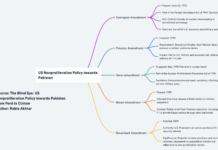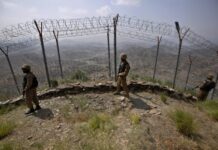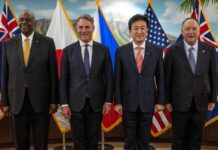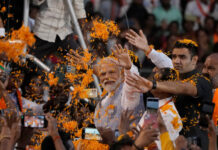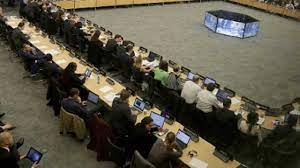Claude Rakisits
Quite surprisingly, the Financial Action Task Force’s (FATF) decision on October 21, to remove Pakistan from its “grey list” went almost unnoticed on the media front. Admittedly, Islamabad had been told at the last meeting of the FATF in June that it had met all the conditions for its removal from its “grey list” and that it would only require an in-country visit by its officials to confirm the good news. The exit from the “grey list” is indeed very good news for Pakistan, one that would not have come too early.
FATF is a Paris-based inter-governmental watchdog of 39 countries which monitors countries’ financial and banking systems efficiency in countering terror-related activities. Accordingly, in deciding to remove the country from the “grey list”, FATF stated that it welcomed Pakistan’s “significant progress” in improving its anti-money laundering and combating financing terror (AML/CFT) regime. Pakistan had been on the “grey list” since June 2018, well over four years. Almost de rigueur India did everything it could to keep Pakistan on the “grey list”, but China played a critical role in blocking this diplomatic manoeuvre.
By no longer being on the “grey list”, Pakistan will more easily access funds from international financial organisations like the International Monetary Fund (IMF) and the World Bank, to help finance development projects. It will also make it easier for Pakistan to attract Foreign Direct Investment (FDI) into the country. And in the wake of the devastating recent floods, Pakistan will desperately need access to funds to rebuild the unimaginable infrastructural damage and destruction of roads, railroads, houses, and dams. According to the government, the cost of repair will be at least $30 billion, if not more, and will take many years to complete. Prime Minister Shehbaz Sharif has made it very clear that this is a calamity on such a massive scale that the country cannot cope with it on its own—no country could. And this natural disaster comes at a time when Pakistan is already in dire straits economically—20 per cent inflation, $130 billion external debt, and a 20 per cent poverty level (which is expected to go up following the floods). Sadly, but not surprisingly, raising international funds for Pakistan’s flood relief has been problematic, made more challenging by donor countries’ own financial difficulties in the wake of the COVID-19 pandemic.
The improvement in bilateral relations with the U.S.—probably the best they have been for many years—would have been a critical factor in Pakistan finally being taken off the “grey list”. For example, Washington and Islamabad agreed in September to a $450 million F-16 sustainment package for the Pakistan Air Force. And there is even talk of resuming military officers’ training at American colleges and academies and possibly resuming access to other military hardware. This military rapprochement is happening even though the U.S. and India have been developing a strategic relationship for the past 15 years. Moreover, since the U,S. left Afghanistan last year, the Biden administration has increasingly approached Pakistan in its own right. This de-hyphenation of Pakistan from Afghanistan has been greatly appreciated by the Sharif administration. Whilst not publicly acknowledged, the two countries have also been most likely cooperating on the counterterrorism front as well. The elimination of the leader of al-Qaeda, Ayman al-Zawahiri, in a U.S. drone strike—most likely originating from Pakistan—in Kabul, in August would support this thesis. The U.S. was one of the largest donors to assist Pakistan with the floods, with almost $60 million in humanitarian aid.
Undoubtedly, the political departure of Imran Khan as prime minister in April 2022 helped improve bilateral relations. PM Khan’s very public and regular criticism of the Trump and Biden administrations during his premiership did not help matters. Moreover, since Khan lost power in a parliamentary vote of no confidence in April, he has regularly accused the U.S. of being behind his removal from power.
But whilst bilateral relations with the U.S. have improved, and Chief of Army Staff General Bajwa’s and Foreign Minister Bilawal-Bhutto Zardari’s recent trips to the U.S. went very well, there is still a lack of trust lingering in the air. This is not surprising given the mistrust, disappointments, and misunderstandings over the last 75 years. These sentiments have been reinforced by Washington’s deepening strategic relations with India, Pakistan’s arch-rival, and Islamabad’s long-standing “all-weather” friendship with Beijing , the U.S. “most consequential geopolitical challenge”, and its past support for the Taliban. Pakistan’s neutral position on Russia’s invasion of Ukraine would not have assisted matters. These are differences that cannot be ironed out overnight.
Two recent examples give an indication of the trust deficit which still needs to be bridged. On October 15, President Biden described Pakistan as “one of the most dangerous nations in the world” and, seemingly, questioned its nuclear weapons safety protocols. This is not a statement one would expect from someone who is trying to rebuild relations. It was unnecessary and damaging. Pakistan’s Foreign Office called in the U.S. Ambassador to explain the statement. Turning to the second example, the Biden administration’s recently-released National Security Strategy makes no mention of Pakistan even though Pakistan has had a military partnership with the U.S. for over 70 years and it is a major Non-NATO Ally (MNNA), a status only given to a few countries. India, on the other hand, is repeatedly mentioned in the context of the Quadrilateral Security Dialogue (Quad) and as being the largest democracy in the world. And despite the fact that Biden stressed during his campaign for the presidency that human rights would be the center of his administration’s foreign policy, there is no mention of the United Nations-recognized disputed territory of Kashmir—effectively under political lockdown for the last three years, and India’s increasingly repressive actions against minority groups, particularly Muslims.
So while things are improving externally for Pakistan, especially on the international financial front, there is still a long ways to travel on the road to deepening Pak-U.S. relations. General Bajwa made it publicly clear that he very much valued ties with Washington. Similarly, during his recent trip to the U.S., he reportedly said that he sought a relationship that was broader than military links, one that also included connections in infrastructure, technology, health, and trade. This is a big call given the historical baggage and Pakistan’s close economic and military relations with China. Nevertheless, it is a goal Washington should seriously entertain given the critical geo-strategic importance of Islamabad in a part of the Indo-Pacific which will become increasingly important as China-U.S. competition becomes more intense.
Dr.Claude Rakisits is an Honorary Associate Professor in the Department of International Relations at the Australian National University in Canberra, Australia.



